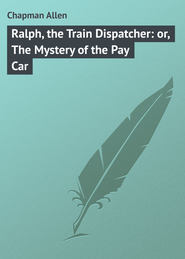По всем вопросам обращайтесь на: info@litportal.ru
(©) 2003-2024.
✖
Ralph on the Engine: or, The Young Fireman of the Limited Mail
Настройки чтения
Размер шрифта
Высота строк
Поля
“Yes, I sold out a lot of cheap shoes to farmers which I got at a bargain at an auction,” explained Joe. “Then I struck a fine new scheme. It brought me here. I’ll explain to you later. Your story is the one that interests me. Tell me how you came to be in that scow, Ralph.”
The young fireman brought up the two satchels from the hold of the old craft, and briefly related to Joe the incidents of his experience with Farrington, Slump and the others.
“I say, you have done a big thing in getting those satchels,” said Joe, “and you want to place them in safe hands at once. Come ashore, and I’ll drive you to the nearest railroad town. You don’t want to risk meeting any of your enemies until you have those papers out of their reach.”
When they came up to the wagon, Ralph gazed at its piled-up contents in surprise. The wagon bottom was filled with walnuts and butternuts. There must have been over twelve bushels of them. On top of them was spread a lot of damp rushes and all kinds of wild flowers, mosses and grasses. Two large mud turtles lay under the wagon seat.
“Why, what does all that layout mean?” exclaimed Ralph, in amazement.
“That,” said little Joe, with sparkling eyes, “is an advertising scheme. Some time ago I discovered the finest nut grove in the timber yonder you ever saw. I suppose I could in time have gathered up a hundred wagon loads of them. I intend to make a heap of money out of them. A couple of days ago, though, I thought out a great idea. You know Woods, the dry goods man at the Junction?”
“Yes,” nodded Ralph.
“He is a wide-awake, enterprising fellow, and I told him of my scheme. It caught his fancy at once. The plan was this: every week, I am to trim up his show window with what we call ‘a nature feature.’ We keep pace with vegetation. This week we show a swamp outfit; next week pumpkins and the like; the following week autumn leaves. We work in live objects like turtles to give motion to the scene. Do you catch on?”
“It is an excellent idea and will attract lots of attention,” declared Ralph.
“You bet it will,” assented his comrade with enthusiasm. “Anyhow, my pay is fine and I expect to work other towns in the same way. I will show you the most artistic display window you ever saw when I get this load of truck to town.”
In about two hours they reached a railroad station, and somewhat later Ralph caught a train for the city. He went at once to the office of the president of the Great Northern. There was a long interview. As Ralph left the railroad magnate his face was pleased and his heart light and hopeful.
“Fairbanks,” said Mr. Grant, “I cannot express my satisfaction at your discoveries. It is as we supposed – some individual has been encouraging the strikers. There are ample proofs among these papers of the fact that Gasper Farrington has hired the strikers to commit all kinds of misdeeds to scare stockholders of the road. He has thus been enabled to buy up their stock at a reduced figure, to make an enormous profit when the strike is over. He had a scheme to tap our wires and cause further complications and trouble. Within a week the backbone of the strike will be broken, and we shall not forget your agency in assisting us to win out.”
Ralph went back to Stanley Junction that same day. He related all his varied adventures to his mother that evening.
“One thing I discovered from those documents in the satchels,” said Ralph. “Farrington has transferred all his property to Bartlett so we could not collect the money he owes us.”
“Then we shall lose our twenty thousand dollars after all,” said Mrs. Fairbanks anxiously.
“Wait and see,” replied Ralph, with a mysterious smile. “I am not yet through with Gasper Farrington.”
CHAPTER XXII
THE LIMITED MAIL
“All aboard!”
The conductor of the Limited Mail gave the signal cheerily. Ralph swung in from his side of the cab on the crack locomotive of the road. Old John Griscom gave a chuckle of delight and the trip to the city began.
It was ten days after the adventure in the scow – ten days full of activity and progress in the railroad interests of the Great Northern. This was the morning when old-time schedules were resumed and every part of the machinery of the line went back to routine.
“I tell you, lad, it feels good to start out with clear tracks and the regular system again. I’m proud of you, Fairbanks. You did up those strikers in fine style, and it will be a long time before we shall have any more trouble in that line.”
“I hope so, Mr. Griscom,” said Ralph. “The company seems determined to teach the strikers a lesson.”
This was true. Immediately after the visit of Ralph to the city, the railroad people had set at work to make the most of the evidence in their hands. A statement of the facts they had discovered was given to the public, a series of indictments found against Gasper Farrington, Bartlett, Jim Evans and others, and a vigorous prosecution for conspiracy was begun. Among the most important witnesses against them was Zeph Dallas. Farrington and Bartlett disappeared. Evans and the others were sent to jail.
A great revulsion in popular sentiment occurred when the true details of the strike movement were made known. The respectable element of the old union had scored a great victory, and work was resumed with many undesirable employes on the blacklist.
It seemed to Ralph now as though all unfavorable obstacles in the way of his success had been removed. He believed that Slump and Bemis were powerless to trouble him farther. As to Farrington, Ralph expected at some time to see that wily old schemer again, for the railroad was in possession of papers of value to the discredited railroad magnate.
Ralph had now become quite an expert at his work as a fireman. There was no grumbling at any time from the veteran engineer, for Ralph had a system in his work which showed always in even, favorable results. The locomotive was in splendid order and a finer train never left Stanley Junction. At many stations cheers greeted this practical announcement of the end of the strike.
There was no jar nor break on the route until they reached a station near Afton. The engine was going very fast, when, turning a curve, Griscom uttered a shout and turned the throttle swiftly.
“Too late!” he gasped hoarsely.
The young fireman had seen what Griscom saw. It was an alarming sight. At a street crossing a baby carriage was slowly moving down an incline. A careless nurse was at some distance conversing with a companion. The shrill shriek of the whistle caused her to discover the impending disaster, but she had become too terrified to move.
Ralph readily saw that speed would not be greatly diminished by the time the locomotive overtook the child in the baby carriage, and in a flash he acted. He was out on the running board and onto the cowcatcher so quickly that he seemed fairly to fly. Grasping a bracket, the young fireman poised for a move that meant life or death for the imperiled child.
The locomotive pounded the rails and shivered under the pressure of the powerful air brakes. Ralph swung far down, one hand extended. The baby carriage had rolled directly between the rails and stood there motionless.
It contained a beautiful child, who, with an innocent smile, greeted the approaching monster of destruction as if it were some great, pleasing toy. Ralph’s heart was in his throat.
“Grab out!” yelled Griscom, fairly beside himself with fear and suspense.
The young fireman’s eyes were dilated, his whole frame trembled. Quick as lightning his hand shot out. It met in a bunch of the clothing of the child. He lifted; the vehicle lifted, too, for a strap held in its occupant.
There was a terrific tension on the arm of the young railroader. The lower part of the vehicle was crunched under the cowcatcher and the child was almost borne away with it. Then the pressure lightened. With a great breath of relief and joy Ralph drew the child towards him, tangled up in the wreckage of the baby carriage.
The train stopped. Griscom did not say a word as they backed down. His face was white, his eyes startled, his breath came hard, but he gave his intrepid young assistant a look of approbation and devotion that thrilled Ralph to the heart.
A crowd had gathered around the distracted nurse at the street crossing. She was hysterical as the rescued child was placed in safety in her arms. Other women were crying. A big policeman arrived on the scene. Griscom gave the particulars of the occurrence.
“Name, please?” said the officer to Ralph.
“Oh, that isn’t necessary at all,” said Ralph.
“Isn’t it? Do you know whose child that is?”
“No,” said Ralph.
“The father is Judge Graham, the richest man in the town. Why, he’d hunt the world over to find you. A lucky fellow you are.”
Ralph gave his name and the train proceeded on its way amid the cheers of the passengers, who had learned of the brave act of the young fireman. When terminus was reached, a fine-looking old lady approached the locomotive.
“Mr. Fairbanks,” she said to Ralph, “the passengers desire you to accept a slight testimonial of their appreciation of your bravery in saving that young child.”
Ralph flushed modestly.
“This looks like being paid for doing a simple duty,” he said, as the lady extended an envelope.
“Not at all, Mr. Fairbanks. It was a noble act, and we all love you for it.”
“I think more of that sentiment than this money,” declared Ralph.
The envelope contained fifty dollars. Griscom told the story of the rescue all over Stanley Junction next day, and the local newspapers made quite an article of it.











